Okeanos was named one of Fast Company’s 2022 World Changing Ideas!
+
|
|
||
|
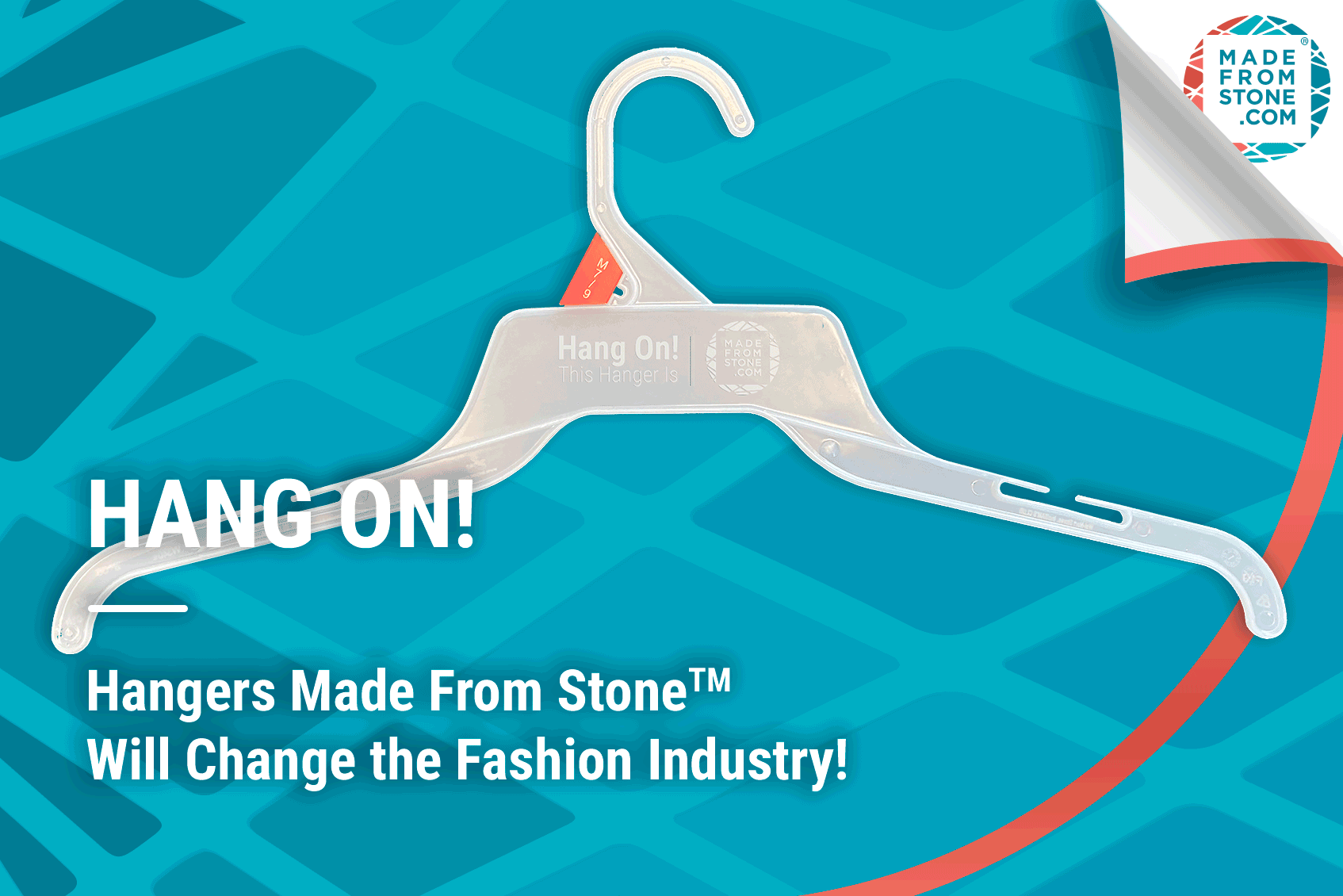
Did you know that the garment industry uses 180 billion plastic bags to protect and transport clothing, and 100 billion hangers? Unfortunately, 85% of that material gets thrown away.
Made From Stone is here to make measurable change in the fashion industry.
Hangers Made From Stone:
And most importantly, available now!
Hang out with us! To learn more about making your hangers from stone, get in touch with
trade@madefromstone.com

Last week, on Coagronorte’s 55th anniversary, Okeanos was thrilled to be on hand to celebrate their Made From Stone, low-carbon footprint packaging for Arroz Zulia, made with less plastic…and it’s no surprise that they celebrated this accomplishment with a splash! From leading Colombian media outlets (Read an interview with our CEO here!) to a fleet of branded trucks, the well attended event featured speakers, panel discussions, and an opportunity for those in attendance to experience the new packaging in person.
Coagronorte, the leading agricultural cooperative of small farmers in Colombia, has been integrating sustainable practices into their operations for years. Comprised of 560 farmers from across the country who are experiencing the effects of climate change firsthand, this group is eager to adopt immediate and affordable solutions. The members of the co-op unite to access technologies and equipment that the individual farms can’t afford independently.
At the event, the Okeanos team had the chance to meet and speak with some of the rice farmers, who were emotional about the opportunity to have access to technology that allows them to make more sustainable products.
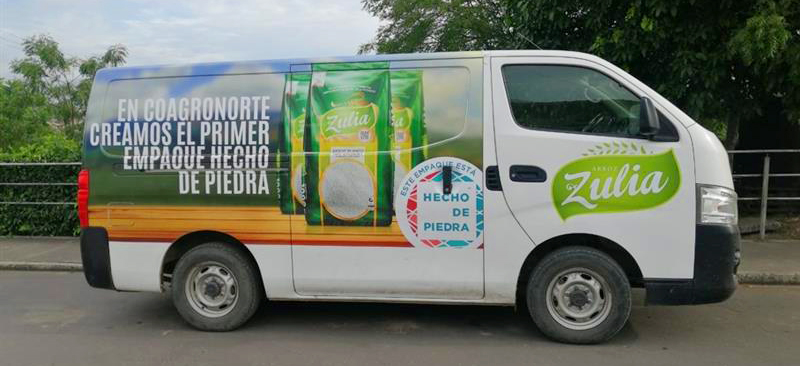
To learn more about how to bring Made From Stone solutions to communities near you, contact trade@madefromstone.com

From the Philippines to the UK, governments are putting legal frameworks for Extended Producer Responsibility into place. An environmental protection strategy, EPR is designed to achieve a measurable decrease in the environmental impact of a product by making the manufacturer of the product responsible for the entire life cycle of a product including take-bake, recycling, and final disposal. So, what does this mean for your favorite global brands? Global brands now have to be proactive about collection, reuse and disposal of the products they make! But how will global governments navigate the enforcement of these regulations?
In the UK, EPR laws which go into effect in 2023 will focus specifically on producers of household packaging waste. These producers will be incentivized financially to make packaging that is more widely collected by recyclers. On the flipside, those that use packaging that doesn’t comply with the new laws could face steep financial penalties.
Across the pond in the state of New York, where seven million tons of paper and packaging waste are generated each year, recycling costs are paid by the taxpayers in the form of property taxes or increased waste management fees. New York’s governor passionately believes that this responsibility should fall back into the hands of the producers, who should be paying the waste management companies directly, and has included an EPR proposal in her first executive budget.
Across Southeast Asia, the World Wildlife Fund (WWF) has unveiled a pilot program aimed at encouraging companies to tackle EPR from the beginning of their supply chain, encouraging the manufacture of more eco-conscious products.
While these new laws may seem daunting to brands, there is good news…Okeanos can help! Connect with us at hello@madefromstone.comto learn about how easy making the switch to stone can be.
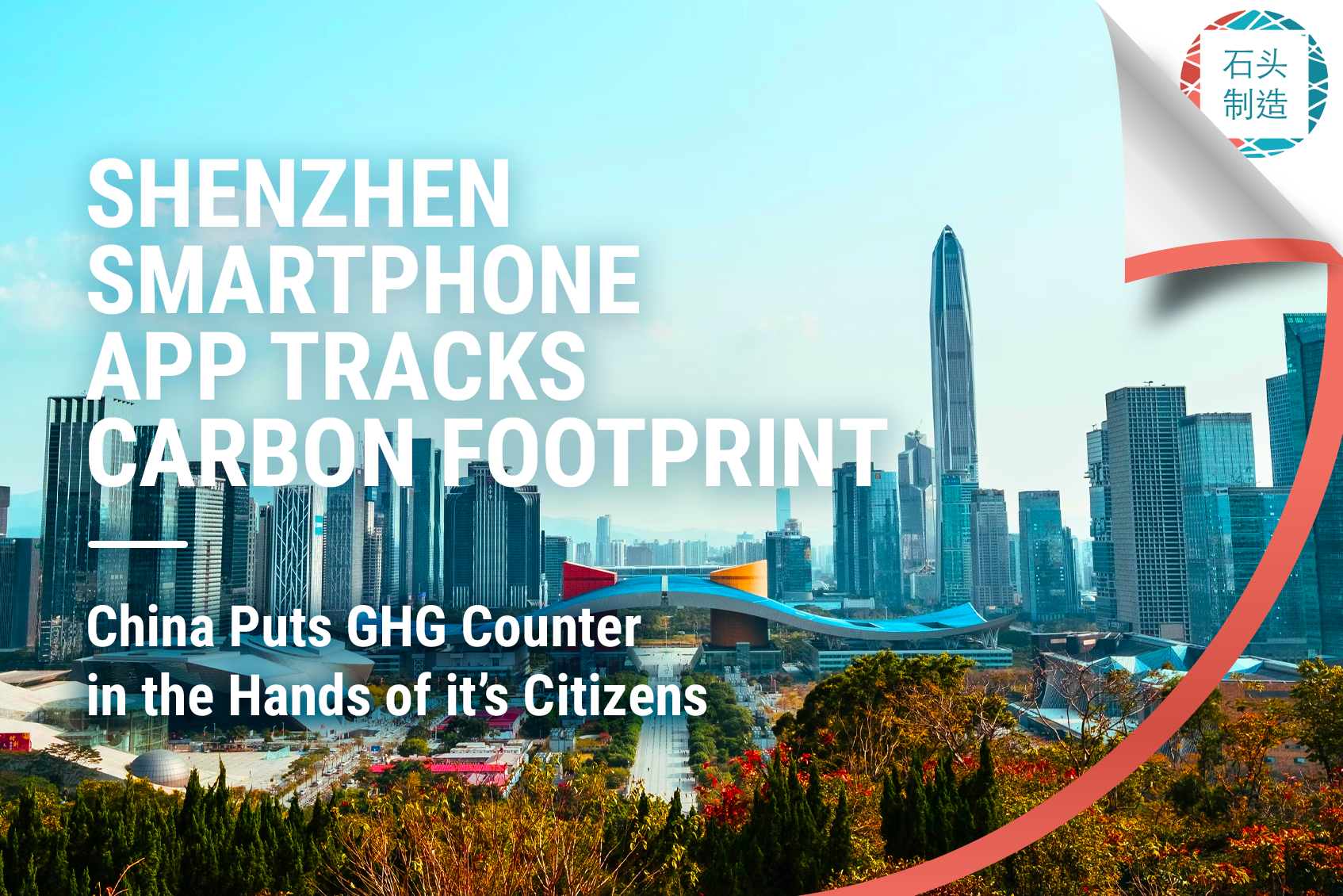
In the Chinese tech hub of Shenzhen, citizens will now be able to keep their fingers on the pulse of their personal carbon footprints with the help of a new app. The application, released by the government, focuses on the carbon emissions generated from daily electricity use, which is a leading source of GHG emissions in the city. China has set ambitious goals for its GHG targets, hoping to hit it’s emissions peak before 2030 and achieve carbon neutrality before 2060. Currently, the average emission of a Shenzhen household can reach 913 kg of CO₂. To put that in perspective, 50 trees per household would have to be planted per year to offset that impact.
The government hopes that the app, which shows a ranking among users and awards virtual badges to those hitting reduction targets, will encourage citizens to take a more active role in reducing their emissions. There are also plans for real life financial incentives. By 2023, residents can put the carbon emissions amount they’ve cut on the China Emissions Exchange for trading. Gains can be “cashed out” for gift cards or subway cards!
Did you know that products made using our technology each bear their own mini carbon footprint calculator?
Visit our ESG page to learn more about how Okeanos is committed to tackling societal challenges worldwide.
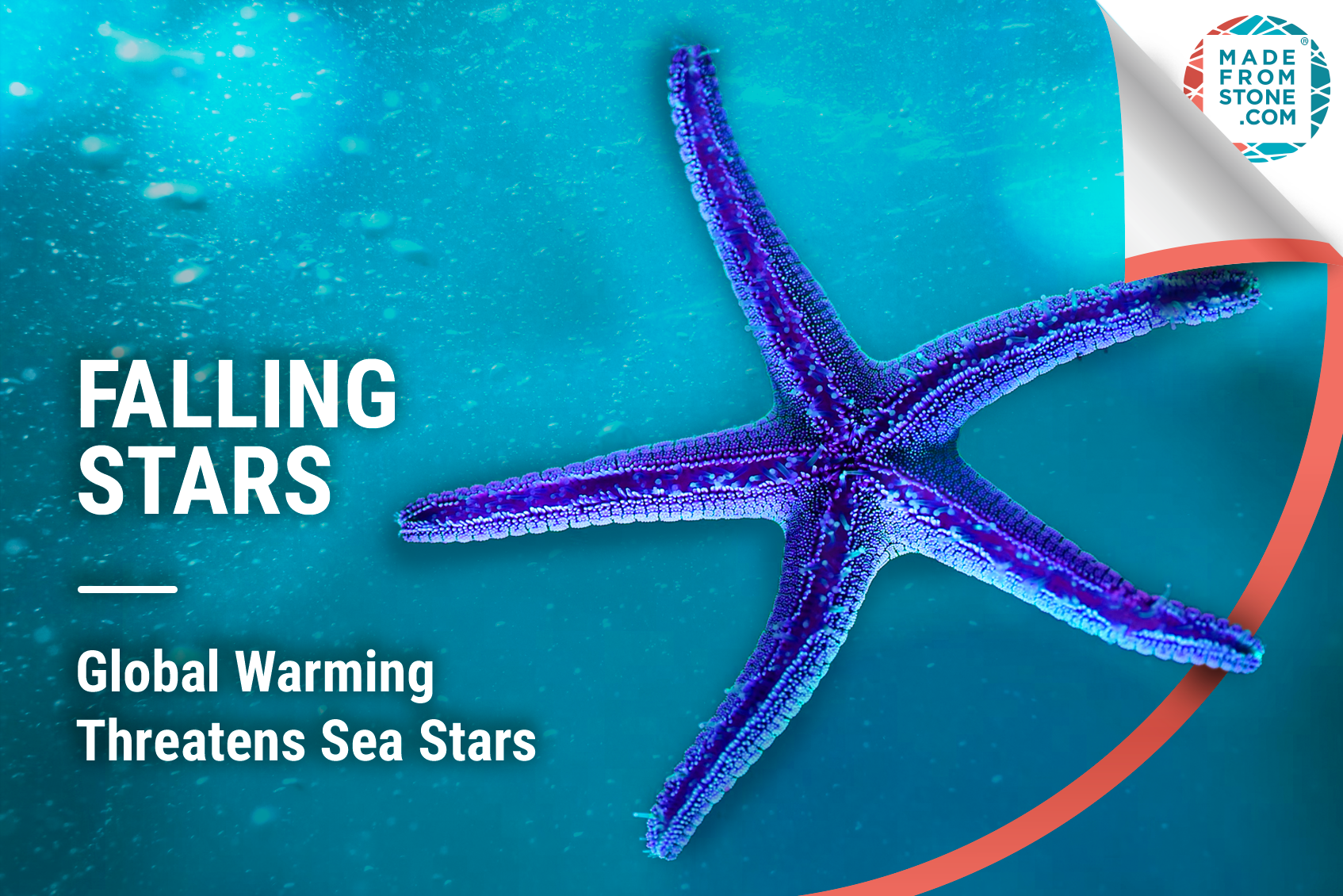
In this section of Set In Stone, we like to highlight the surprising, unique, and unusual phenomena and creatures that make our Okeanos worth preserving. Meet Linckia Laevigata!
Did you know that sea stars, also known as starfish, aren’t actually fish at all? These incredible invertebrates are most commonly shaped like a star with five arms, but some species can have as many as 40 arms! But just like other marine animals, these vibrant and colorful creatures are falling victim to climate change.
According to the Canadian Royal Society, starfish populations around the world are declining drastically. This change is most noticeable in the warming waters of the Pacific Ocean off the coast of Mexico and California. Starfish are an essential part of the ocean ecosystem, keeping sea urchin populations in check. Now uninhibited, sea urchins threaten underwater kelp forests, which are natural carbon sinks, trapping CO₂.
Want to see more stunning sea-creatures?
Click here to head over to our Instagram.
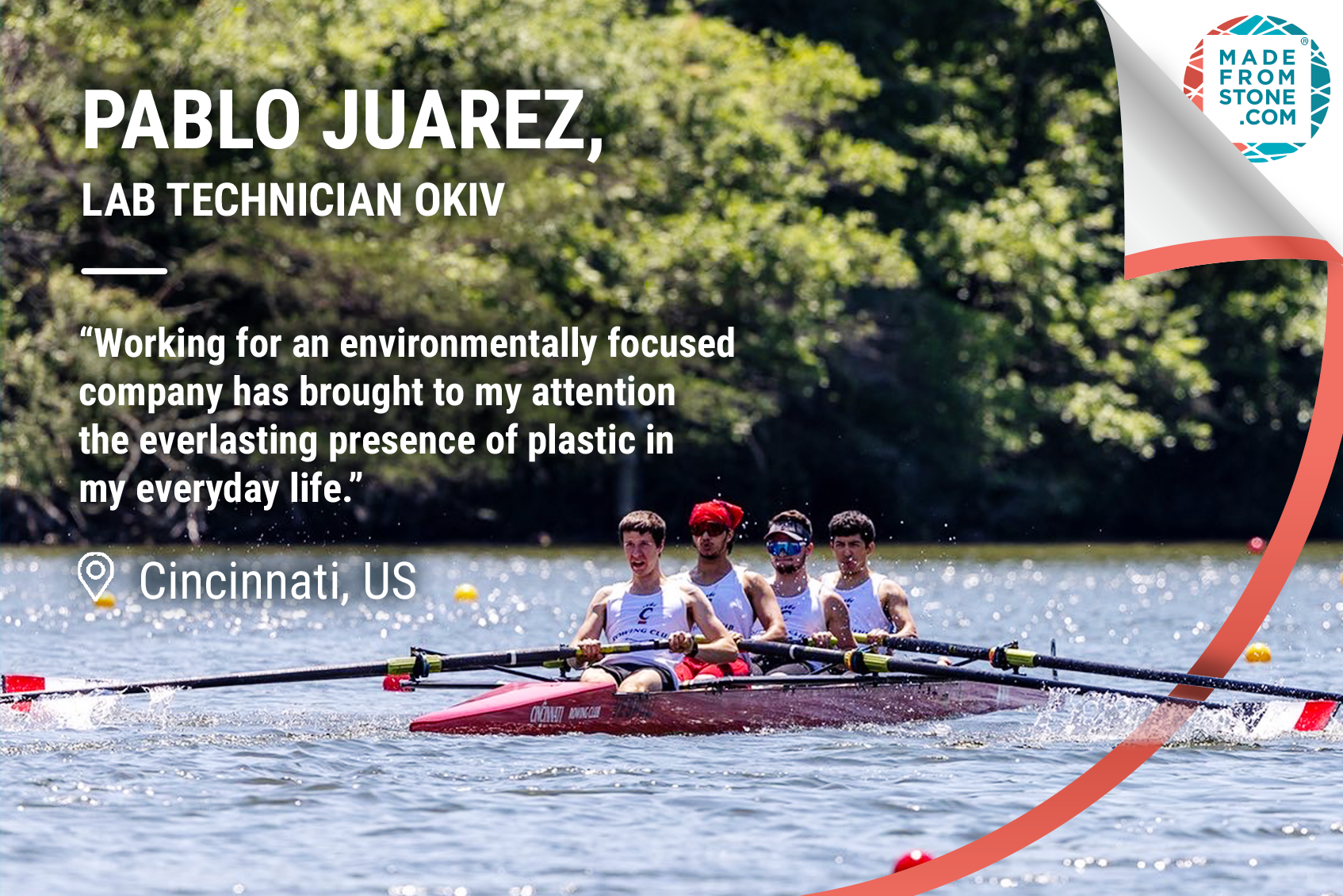
Meet Pablo Juarez, our Rockstar of the Month! Pablo is a Lab Technician at the Okeanos Innovation Center working to further our technological capabilities. Read on to learn more about Pablo’s passion for sustainability.
Tell us about your childhood. Did you spend time by the ocean?
I grew up in Mexico City where my family and I would go to the port city of Veracruz during spring break. There we would eat all sorts of seafood and lay by the ocean for days on end.
How has working for an environmentally focused company impacted the choices you make in your daily life?
Working for an environmentally focused company has brought to my attention the everlasting presence of plastic in my everyday life. This has encouraged me to reduce my consumption of plastic by using reusable shopping bags and water bottles while raising awareness about plastic consumption and the impact that plastic is having in our environment.
How has the conversation on sustainability transcended the field of material science?
The conversation on sustainability has transcended the field of material science by starting conversations on topics like battery production, energy production, and development of new sustainable materials, just to name a few. These conversations have sparked huge interest in developing technologies like electric cars, renewable energy generation and sustainable plastic technologies.
If you could pick a body of water anywhere in the world to spend time near, where would it be?
If I could pick a body of water to spend time near, I would pick Lake Michigan. Somewhere near Chicago or on a sand dune in Michigan.
What new skill or hobby did you pick up during quarantine?
During quarantine I picked up rowing to keep myself busy and spend some time outdoors.
Now that the world is beginning to re-open, what is the thing you’re most looking forward to?
Now that the world is reopening, I am most excited to go to concerts and music festivals.
Want to be part of Okeanos team?
Check out Careers page!
News You Should Know:
| Cookie | Duration | Description |
|---|---|---|
| cookielawinfo-checkbox-analytics | 11 months | This cookie is set by GDPR Cookie Consent plugin. The cookie is used to store the user consent for the cookies in the category "Analytics". |
| cookielawinfo-checkbox-functional | 11 months | The cookie is set by GDPR cookie consent to record the user consent for the cookies in the category "Functional". |
| cookielawinfo-checkbox-necessary | 11 months | This cookie is set by GDPR Cookie Consent plugin. The cookies is used to store the user consent for the cookies in the category "Necessary". |
| cookielawinfo-checkbox-others | 11 months | This cookie is set by GDPR Cookie Consent plugin. The cookie is used to store the user consent for the cookies in the category "Other. |
| cookielawinfo-checkbox-performance | 11 months | This cookie is set by GDPR Cookie Consent plugin. The cookie is used to store the user consent for the cookies in the category "Performance". |
| viewed_cookie_policy | 11 months | The cookie is set by the GDPR Cookie Consent plugin and is used to store whether or not user has consented to the use of cookies. It does not store any personal data. |
